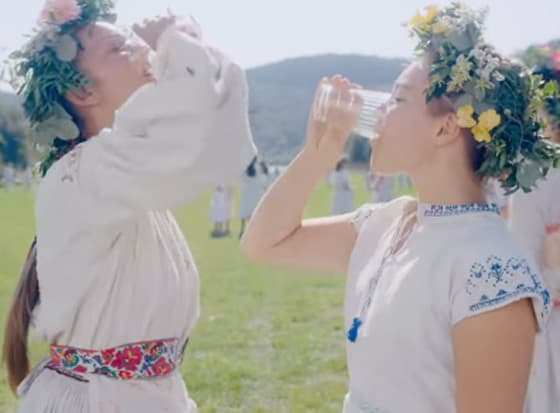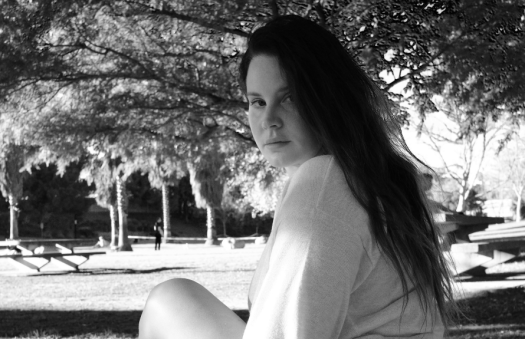There's a scene early on in Midsommar where our central cast of blissfully unaware tourists are driving to a once-in-a-century Scandanavian folk festival. The camera pans out to a wide shot of their car on a peaceful, remote road — nothing but blue skies and pale green grass. We see the banner announcing the festival stretched high above the road between two trees, and then, the camera rotates, until we're looking at the sign from upside down, and we hold on that image for an uncomfortably long time.
The trees are still beautiful, and the sky is still stunningly blue, but it feels wrong on an instinctive level. Much of Midsommar echoes this same feeling of slow, creeping dread set in a blindingly sunny pastoral village that belies an animalistic violence, and rips all the pretense and posturing from its unwitting prey.
Ari Aster, director of 2018's terrifying gut-punch Hereditary, returns with his second feature, Midsommar, and it's just as packed with emotional rawness and unsettling iconography. After a tragic incident puts a splinter in Dani (Florence Pugh) and Christian's (Jack Raynor) already-fractured relationship, Dani invites herself to join Christian and his friends (Will Poulter, William Jackson Harper and Vilhelm Blomgren) on a trip to a midsummer festival in a remote Swedish village. Once they arrive, it's quickly apparent that something sinister is lurking underneath the placid faces of their welcoming hosts. But after days of strange rituals under the ever-present, washed-out sun, the dread starts to mount, and Midsommar unravels into a disturbing, visceral folk tale. It's less tightly paced and intimately grotesque than Hereditary, but more ambitious in scope and in sprawling, surreal dread.
As symbolically rich as a Jodorowsky hippie acid trip with the pagan matriarchal horror of The Wicker Man, Midsommar feels like a nightmare that started off as a dream. At several points throughout, characters imbibe hallucinogenic substances, and the film starts to echo their altered states. Objects within the frame, especially flowers in a riot of colours, inexplicably sway and ripple, and the obsessively detailed art and architecture of the Hårga takes on aspects of the unreal. Scenes of violence are sculpturesque in arrangement and staging, even at their most gory. Despite the rare moments when the pace lags (Midsommar earns most of its 140 minute running time, but not all), everything is too horrifically fascinating to look away from.
Dani and Christian's disintegrating relationship is relatably awkward in the film's first act, but it transcends any sort of reality once the group arrives at the Hårga village. Midsommar has already been categorized as a "breakup movie" by the press, but it doesn't quite fit into this box. Midsommar isn't so much a romantic breakup film as it is a total disintegration of structured relationships in general. From platonic friendships to romantic to even academic, as the new norm becomes lost, the central protagonists become just as hypnotized by their strange, otherworldly surroundings as the audience is. All the performances are on-point, but this is really Florence Pugh's show, as she effortlessly floats between heartbreak, panic, grief and grace.
Midsommar explores a huge variety of themes, from "adventure" tourism to fidelity and empathy, and even touches on the inversion of traditional gender norms in matriarchal societies. Above all, Midsommar is about grief — but not in the same way as Hereditary. It's about the power and ferocity of base human emotion, the rhyme rather than the reason, and what happens when that emotion is self-contained and self-denied. The power of catharsis is the real show-stopper behind Midsommar — letting go with animalistic violence, of screaming into the void and gaining base pleasure when the void screams with you.
(A24)The trees are still beautiful, and the sky is still stunningly blue, but it feels wrong on an instinctive level. Much of Midsommar echoes this same feeling of slow, creeping dread set in a blindingly sunny pastoral village that belies an animalistic violence, and rips all the pretense and posturing from its unwitting prey.
Ari Aster, director of 2018's terrifying gut-punch Hereditary, returns with his second feature, Midsommar, and it's just as packed with emotional rawness and unsettling iconography. After a tragic incident puts a splinter in Dani (Florence Pugh) and Christian's (Jack Raynor) already-fractured relationship, Dani invites herself to join Christian and his friends (Will Poulter, William Jackson Harper and Vilhelm Blomgren) on a trip to a midsummer festival in a remote Swedish village. Once they arrive, it's quickly apparent that something sinister is lurking underneath the placid faces of their welcoming hosts. But after days of strange rituals under the ever-present, washed-out sun, the dread starts to mount, and Midsommar unravels into a disturbing, visceral folk tale. It's less tightly paced and intimately grotesque than Hereditary, but more ambitious in scope and in sprawling, surreal dread.
As symbolically rich as a Jodorowsky hippie acid trip with the pagan matriarchal horror of The Wicker Man, Midsommar feels like a nightmare that started off as a dream. At several points throughout, characters imbibe hallucinogenic substances, and the film starts to echo their altered states. Objects within the frame, especially flowers in a riot of colours, inexplicably sway and ripple, and the obsessively detailed art and architecture of the Hårga takes on aspects of the unreal. Scenes of violence are sculpturesque in arrangement and staging, even at their most gory. Despite the rare moments when the pace lags (Midsommar earns most of its 140 minute running time, but not all), everything is too horrifically fascinating to look away from.
Dani and Christian's disintegrating relationship is relatably awkward in the film's first act, but it transcends any sort of reality once the group arrives at the Hårga village. Midsommar has already been categorized as a "breakup movie" by the press, but it doesn't quite fit into this box. Midsommar isn't so much a romantic breakup film as it is a total disintegration of structured relationships in general. From platonic friendships to romantic to even academic, as the new norm becomes lost, the central protagonists become just as hypnotized by their strange, otherworldly surroundings as the audience is. All the performances are on-point, but this is really Florence Pugh's show, as she effortlessly floats between heartbreak, panic, grief and grace.
Midsommar explores a huge variety of themes, from "adventure" tourism to fidelity and empathy, and even touches on the inversion of traditional gender norms in matriarchal societies. Above all, Midsommar is about grief — but not in the same way as Hereditary. It's about the power and ferocity of base human emotion, the rhyme rather than the reason, and what happens when that emotion is self-contained and self-denied. The power of catharsis is the real show-stopper behind Midsommar — letting go with animalistic violence, of screaming into the void and gaining base pleasure when the void screams with you.




